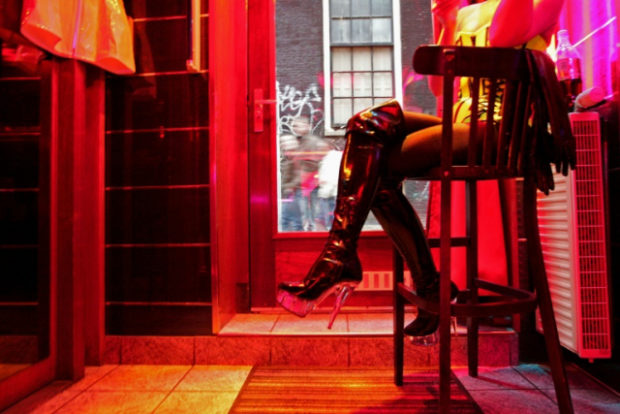
It is no coincidence that the organizers of this year’s International AIDS Conference chose to hold it in Amsterdam. Image: AFP/Anoek de Groot
“If they don’t agree to using a condom, I kick them out,” says Foxxy Angel, a 47-year-old platinum blonde sex worker, sporting some fearsome tattoos, in Amsterdam’s notorious red light district.
The Netherlands’ biggest city is almost synonymous with the sex shops, brothels and prostitutes huddled in the narrow streets close to the main train station, drawing perhaps even more tourists than they do clientele.
Some of the city’s quaint narrow houses serve as brothels with their characteristic bay windows on the ground floor, where the sex workers sit under red neon lights awaiting the next customer.
It is no coincidence that the organizers of this year’s International AIDS Conference, which starts on Monday, chose to hold it in Europe’s city of sin.
“When we chose Amsterdam, it was very much with the idea of shining a light on the most vulnerable people exposed to HIV,” the human immunodeficiency virus that causes AIDS, says Linda-Gail Bekker, president of the International AIDS Society.
“If we pay no attention to these people, then we will lose the fight against AIDS,” she told AFP on a visit to the red light district on Saturday.
Free HIV tests
The sex sworkers did not expect some of the world’s leading scientists and doctors to traipse through the carpeted corridors and gloomily lit bedrooms of the brothels to see for themselves the risks faced by those who ply “the oldest profession in the world.”
“I never have sex without condoms and I go for tests four times a year for STDs (sexually transmitted diseases) and HIV,” says Foxxy Angel, sitting in a red velvet armchair and eating a sandwich for lunch.
After more than 30 years of research, no cure or vaccine has been found for HIV, which has infected around 80 million people worldwide since the start of the epidemic in the 1980s.
Among those infected are colleagues of Foxxy Angel and Elsa, the young sex worker in the next window. It’s been a long time since HIV was taboo here.
“I’m not scared at all. Some of my friends are HIV-positive and still carry on working. It’s possible nowadays,” says the 25-year-old American, referring to the progress medicine has made in treating those infected with the virus.
Prostitution was legalized in the Netherlands in 2000 and sex workers can register with the local chamber of commerce and pay income tax.
Around 7,000 people work in the paid-sex sector in Amsterdam, with around 75 percent of them coming from low-income countries, particularly eastern Europe, according to official figures.
Staying vigilant
Describing herself as “married and polyandrous,” Elsa says she has been a sex worker since the age of 17.
The window where she sits looks out onto one of Amsterdam’s many canals and is opposite the brothel where she first worked when she arrived in the Netherlands, having fled the many restrictions on her trade in the United States.
Like Foxxy Angel, Elsa goes for HIV tests several times a year at a center financed by the city near their workplace.
“I’m very careful, I use condoms. But the tests are free, so I take advantage of them,” says the young woman, dressed in a pink top and black leggings.
If mores have changed since the arrival of AIDS, and the condom has been “democratized”, the sex workers insist they must remain vigilant to the risk of infection.
“Some men try to pull the condom off during sex. If that happens, it’s the end of the session, immediately,” says Foxxy Angel, who worked as a fashion saleswoman before becoming a prostitute 15 years ago.
“I’d never accept that. Not for a million!” she says. CC
RELATED STORIES:
Pulling together to fight HIV/AIDS
127 of 894 new HIV case turn into AIDS